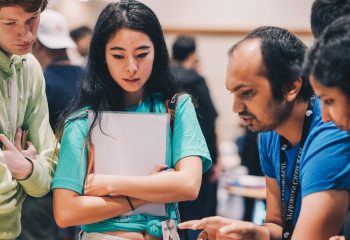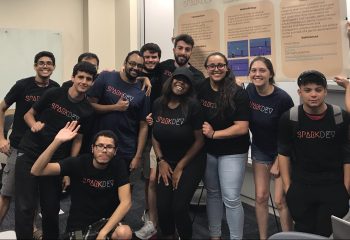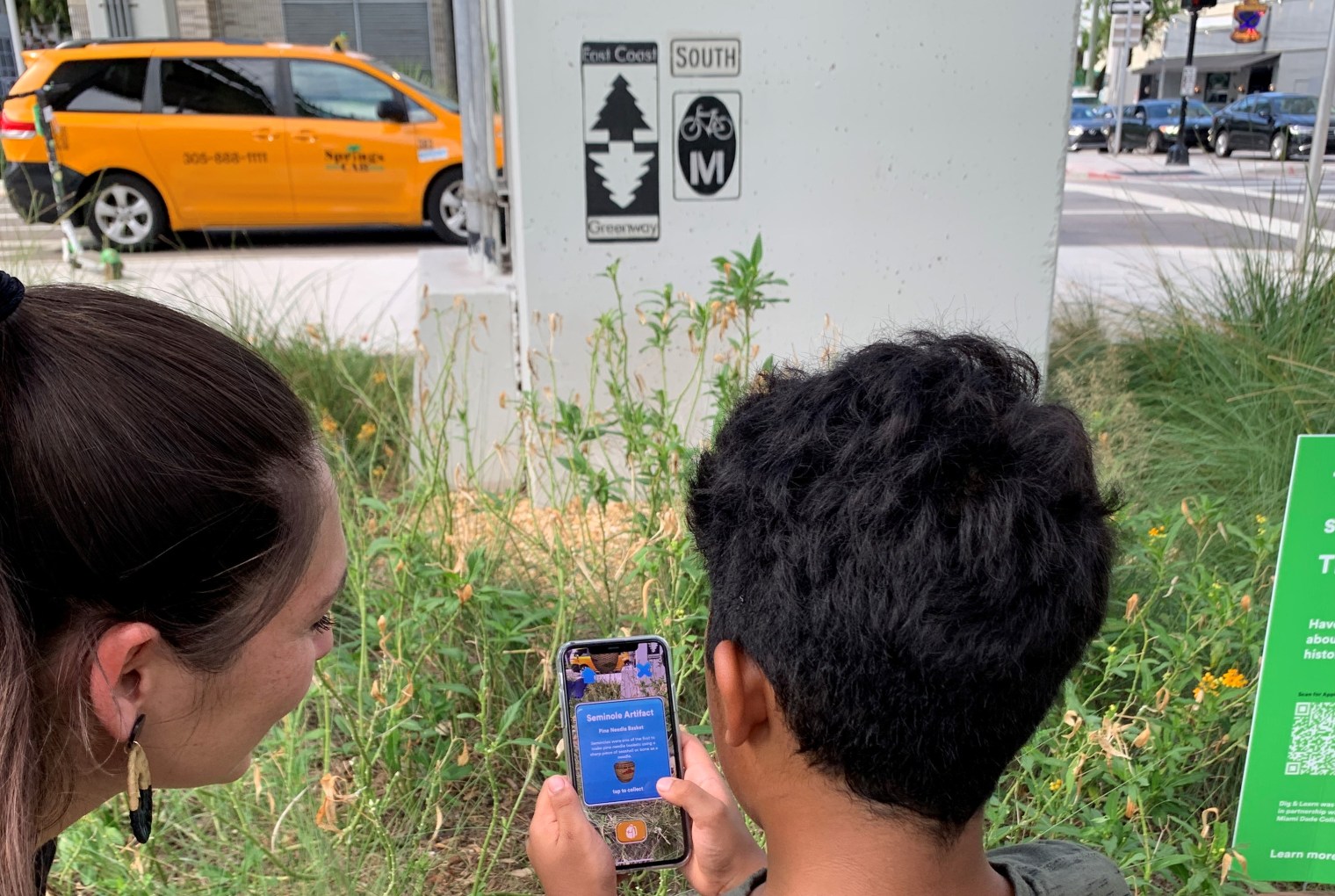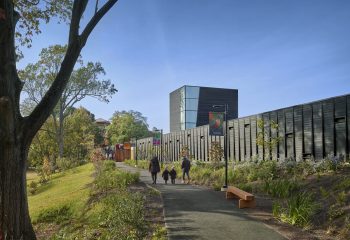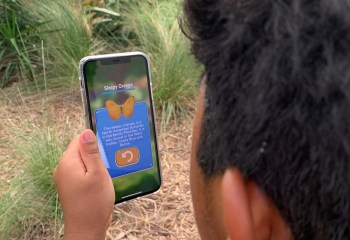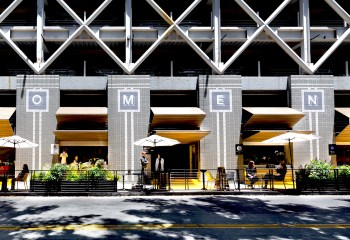To explore the use of Web3 tools in local government nonpartisanpublic engagement efforts and use the city of Philadelphia’s participatory budgeting process as a demonstration use case.
Program Area: Community Impact
New initiative already counts on a total of $55 million from these and other organizations to boost equity in Miami through tech
MIAMI (April 4, 2022) – A collective of organizations, including JPMorgan Chase, the John S. and James L. Knight Foundation, The Miami Foundation and aīre ventures today announced Tech Equity Miami, a transformational initiative that will collectively deploy $100 million in philanthropic funding over five years to advance equity in Miami through tech.
With additional support from Miami-Dade County, the funders’ consortium, which already counts on over $55 million in commitments, will support endeavors that remove entry barriers into the tech industry and that will create opportunities for underrepresented groups, including youth and small businesses.
To measure community impact, all projects that receive a “Tech Equity Miami” designation will contribute information and statistics to a public database that tracks progress towards the initiative’s outcomes and impact goals.
“Our vision for Tech Equity Miami is to effectively direct resources to projects and initiatives that use tech to improve quality of life for individuals, families, and business owners across the economic spectrum,” said Leigh-Ann Buchanan, president of aīre ventures, the venture studio responsible for incubating Tech Equity Miami through operational funding support from Citi Foundation. “Widening disparity, coupled with the national spotlight on Miami as a tech hub of the future, makes this a pivotal moment to drive outcomes-driven systemic change. We believe a model of collective investment and impact reporting can achieve just that.”
Miami’s evolution into a global tech hub is accelerating, with recent reports showing 45 percent growth in venture capital dollars across the metro area. The Brookings Institution and LinkedIn report equally robust growth in the number of tech professionals choosing to work in Miami, with a 30% increase in the net flow of workers in the software and IT sector who moved to the region last year. Similarly, enrollment in tech-related programs at Florida International University and Miami Dade College is experiencing double-digit year-over-year growth.
The tech movement is exposing equity challenges and opportunity gaps. More than 65% of Greater Miami residents identify as Black, Hispanic or Latino, yet of all South Florida tech employees, these groups make up only 12% and 27% respectively. What’s more, only 26 % identify as female. The issue of tech equity goes far beyond representation in the workforce, with census data reporting as many as 100,000 households in Miami without any internet access – roughly one in five homes.
Key areas of focus for Tech Equity Miami include:
- Increasing Digital Access: Facilitating access to broadband connectivity and devices for underserved communities through Miami Connected
- Building the Pipeline: Increasing exposure to high-quality tech learning experiences for K-12 students
- Increasing Pathways: Creating defined pathways into tech-based careers
- Fueling Digital Transformation: Accelerating small business growth by improving their ability to participate in, and benefit from, the digital economy.
Goals for the five-year initiative include:
- Bring internet access and digital literacy to 100,000 Miami-Dade County students currently lacking at-home broadband
- Support on-ramps that bring 25,000 underrepresented students and workers into tech opportunities and experiences
- Provide at least 1,000 micro-businesses with digital transformation training and technology solutions
- Enhance digital exposure and literacy for 50,000 families from underserved communities
To deliver on these goals, JPMorgan Chase, Knight Foundation, The Miami Foundation and Miami-Dade County have committed anchor funding to Tech Equity Miami designated projects. The consortium will work in conjunction with other community partners and individuals to procure additional funding to meet its initial $100 million goal
Support for Tech Equity Miami is part of JPMorgan Chase’s $30 billion racial equity commitment, which aims to help close the racial wealth gap and drive economic inclusion by providing more opportunities for homeownership, access to affordable housing, entrepreneurship and bolstering financial health.
“The growth of the tech industry in Miami is at a critically important stage. As a community, we have the opportunity to grow and shape tech to reflect the incredible diversity of this region and give all Miamians the opportunity to be a part of this important industry,” stated Maria Escorcia, vice president of corporate responsibility at JPMorgan Chase. “By working with Tech Equity Miami, we strive to build a thriving and inclusive tech community, creating businesses and wealth-building opportunities for decades to come.”
“Community demand for careers in tech is growing at an astounding pace. And this demand is coming from all corners of our city,” said Raul Moas, senior director of Knight’s Miami program. “Knight’s investment in our community’s capacity to meet and accelerate this growing demand will build a more engaged, participatory and equitable Miami.”
Miami-Dade Mayor Daniella Levine Cava shares this focus on nurturing home-grown talent. “Miami-Dade County is working tirelessly to not only open the door to tech, but to connect with new industries in conjunction with local talent,” Cava said “As the national epicenter of innovation and entrepreneurship, Miami-Dade is committed to ensuring the growth of our tech industry benefits all members of the community.”
Tech Equity Miami is actively recruiting additional funding partners and projects. To learn more about how to participate, visit www.techequitymiami.org
###
About Tech Equity Miami
Tech Equity Miami is a transformational initiative that aims to deploy $100 million in philanthropic funding over five years to advance equity in Miami through tech. The consortium focuses on four key areas: increasing digital access, building an educational pipeline by increasing exposure to high-quality tech experiences across the region’s K12 students, increasing tech career pathways and fueling digital transformations across small businesses.
About the John S. and James L. Knight Foundation
We are social investors who support a more effective democracy by funding free expression and journalism, arts and culture in community, research in areas of media and democracy, and in the success of American cities and towns where the Knight brothers once published newspapers. Learn more at kf.org and follow @knightfdn on social media.
About JPMorgan Chase
JPMorgan Chase & Co. (NYSE: JPM) is a leading global financial services firm with assets of $3.7 trillion and operations worldwide. The Firm is a leader in investment banking, financial services for consumers and small businesses, commercial banking, financial transaction processing, and asset management. A component of the Dow Jones Industrial Average, JPMorgan Chase & Co. serves millions of customers in the United States and many of the world’s most prominent corporate, institutional and government clients under its J.P. Morgan and Chase brands. Information about JPMorgan Chase & Co. is available at www.jpmorganchase.com. To learn more about how JPMorgan Chase is working to bridge the racial wealth gap, visit jpmorganchase.com/racialequity.
About aīre ventures
aīre ventures is a social impact venture studio that scales technology and innovation solutions to systemic gaps in access, opportunity, and racial equity. The team relies on its proven track record and depth of experience to accelerate sustainable growth, increase investor confidence and maximize social return. In South Florida alone, its portfolio ventures have served over 55,000 innovators, facilitated over 5000 hours of 1:1 training and established partnerships with over 1000 organizations. Learn more at: www.aireventures.org
About The Miami Foundation
The Miami Foundation builds the philanthropic, civic, and leadership backbone for Greater Miami. Since 1967, the Foundation has invested $485 million to strengthen our community with partnerships and contributions from more than 1000 fundholders and 35,000 donors. The Miami Foundation, which currently manages over $350 million in assets, mobilizes donors, nonprofits, leaders, and locals to set a bold vision for our community’s future and to invest in a stronger, more equitable, more resilient Greater Miami.
Miami Dade College to expand emerging tech programs with $15M investment from Knight Foundation, Miami-Dade County, City of Miami and Downtown Development Authority
To expand the capacity of Charlotte’s West Side Community Land Trust (WSCLT) to acquire land and develop affordable housing.
The SJDA will develop a sets of three templated engineering plans under a Creative Commons license (CC-BY-SA) to accelerate and reduce the cost of building public spaces in public rights-of-way.
To test, deploy and encourage adoption of technology platforms to facilitate communication, build volunteer resources for non-profits, and provide access to tools and resources for San Jose community groups.
The High Line Network and Miami’s Underline will use Knight’s support to advance key initiatives devoted to revitalizing public spaces through the power of technology
March 15, 2022 — MIAMI — Technology innovations to design public spaces that better serve communities are heading to cities across America, thanks to investments of more than $1 million from the John S. and James L. Knight Foundation. Knight is supporting both the High Line Network, a North American public space peer network led by the High Line, as well as TThe Underline, a 10-mile park and trail beneath the Miami Metrorail.
This latest investment builds on Knight’s longstanding commitment to support informed and engaged communities by investing in public spaces that help residents feel more connected to their cities and their neighbors. Since 2015, Knight has invested more than $100 million in public space projects aimed at fostering strong bonds between communities. With the increased use of technology in the public realm in communities across the country, Knight’s investments at the intersection of public space and technology seek new ways to engage community members.
Knight’s latest commitment includes $250,000 for the High Line Network, a program of the High Line that supports a group of 37 infrastructure reuse projects across America transforming underutilized public spaces into more equitable and vibrant urban landscapes. The High Line Network will use the funds to launch a Tech and Public Space Accelerator, a program empowering community organizations to identify their own technology needs, develop roadmaps for tech innovations, and ultimately implement tech tools to better serve their residents and communities. An advisory board with national leaders from philanthropy, technology and planning industries will steer the organizations as they define their needs and determine next steps.
“Knight’s support will empower our members to get the most out of their technology planning,” said Asima Jansveld, managing director of The High Line Network. “The Tech and Public Space Accelerator aims to give public space organizations a chance to unlock even more funding while putting them in a better position to adapt to the challenges of the future.”
Miami’s The Underline, a member of the High Line Network, will receive up to $800,000 to expand high-speed internet connectivity along the 10-mile public park, trail and art destination under the Metrorail, serving a projected 15 million users per year. Knight has been a key supporter of The Underline since its launch, investing nearly $3 million to date.
This new Knight investment will provide a match of 1 to 4 for government support to expand uninterrupted wireless internet service across the park’s full ten miles, catalyzing an additional $3.2 million in public funds.
The project will lay the foundation for future Underline technology initiatives, from the installation of mobility sensors to the exploration of cutting edge spatial technology such as augmented reality.
“Our ability to create an inviting and innovative visitor experience depends on having reliable, strong internet access throughout The Underline’s entire park,” said Meg Daly, founder and CEO of Friends of The Underline. “About one in four households in Miami-Dade County lack internet access, and this investment will help close our broadband connectivity gap.”
As a whole, the two grants will allow community organizations to meet the immediate technology needs of their residents while creating opportunities to explore how tech can help solve future public space challenges.
Across the country, cities are investing heavily in projects to breathe new life into public spaces, including those that may be neglected or overlooked. Knight research has shown that the use of key public spaces boomed during the pandemic, highlighting how these spaces are central to community resilience. The most successful public spaces put residents at the center of their development while remaining nimble – adapting and innovating during periods of incredible uncertainty. The pandemic has also accelerated the need for digital transformation, and public space leaders are leveraging technology to connect and engage with their communities.
“The pandemic has made clear how public spaces are vital to our society’s long-term health and vitality,” said Kelly Jin, vice president of Knight’s Community and National Initiatives program. “With these two investments, Knight seeks to leverage technology to reshape the experience in public space and communicate to residents in new ways.”
To learn more about Knight’s strategy to invest in technology that transforms and invigorates public spaces, visit: kf.org/publicspacesfuture
###
About The High Line Network
Presented by the High Line, the High Line Network is a group of infrastructure reuse projects—and the people who help them come to life. As cities become denser and land for traditional parks becomes more scarce, residents are finding creative ways to bring greenspace to their neighborhoods. Projects in the High Line Network transform underutilized infrastructure into new urban landscapes. Redefining what a park can be, these hybrid spaces are also public squares, open-air museums, botanical gardens, social service organizations, walkways, transit corridors, and more. For more information about the High Line Network, please visit network.thehighline.org.
About Friends of The Underline
Our mission is to deliver and activate a 120-acre, world-class linear park spanning 10-miles below Miami’s Metrorail that will transform regional mobility and celebrate diversity, culture and lifelong learning. Through innovative urban trails and creative programming, we are connecting people to their environment and each other to create a safe, healthy, equitable, and sustainable community. For more information visit theunderline.org.
About the John S. and James L. Knight Foundation
We are social investors who support democracy by funding free expression and journalism, arts and culture in community, research in areas of media and democracy, and in the success of American cities and towns where the Knight brothers once published newspapers. Learn more at kf.org and follow @knightfdn on social media.
Knight Foundation invests $925K in visionary technology plan for Miami’s Underline, bringing its total support for the world-class public space to $2 million since 2015
On March 15, 2022, Knight Foundation announced a $1 million investment in the Highline Network and Miami’s Underline to transform public spaces with resident-centered technology. Kelly Jin shares more below.
Free and contiguous high-speed internet through a 10-mile corridor serving 250,000 residents. Augmented reality tours that show residents the untold history of their neighborhood’s development. Computer vision algorithms that can identify patterns of how residents use public spaces. These are just a few examples of how cities are harnessing technology to build more dynamic public spaces.
At Knight Foundation, our Community and National Initiatives (CNI) program invests in public spaces because they cultivate strong bonds between communities, attaching residents to their neighbors and their neighborhoods. Since 2015, Knight has invested more than $100 million in public space projects across the country. We believe dynamic and inclusive public spaces are essential for the long-term health and well-being of cities. Over the last two years, the use of public spaces boomed as the pandemic forced residents outdoors to exercise, relax and recharge.
Our research shows that the most successful spaces put residents at the center of development and embrace flexibility and innovation in their planning. And, technology can help make these public spaces more accessible and engaging for everyone — for example, by making parks more accessible to residents with disabilities, to support English language learners and ultimately breaking down barriers between residents and decision-makers.
We’re doubling down on our investments at the intersection of technology and public space because we believe technology is a critical element of engaging public spaces that creates more informed and engaged communities.
Today, Knight announced two grants that highlight our emphasis on tech as a means to achieve this goal. One of them will go to The High Line Network, a program of the High Line that supports a group of 37 infrastructure reuse projects across North America focused on transforming underutilized urban infrastructure into more inviting landscapes. The network will use Knight’s $250,000 investment to launch an accelerator program, giving community organizations more resources to identify their own technology needs and implement tech tools to better serve their residents.
The Underline, a member of The High Line Network, will use the other grant to expand high-speed internet connectivity along the entire 10-mile public park, trail and art destination under Miami’s Metrorail. This grant is especially notable because it demonstrates how community planners can use private funds to attract more public support for technology development projects. Knight’s $800,000 investment will secure an additional $3.2 million in federal, state and local dollars for The Underline’s technology initiatives. Eventually, this project will increase high-speed internet access for millions of users.
Investments like these demonstrate how technology can responsibly increase community engagement with public spaces. This year, Knight’s public space team (more about them below) seeks to identify opportunities that help answer the question, How can technology in the public realm responsibly improve the lives of our residents and encourage more people to participate in civic life? We seek opportunities that:
- Grow community knowledge and talent at the intersection of public space and public realm; and
- Pilot new ways of engaging residents with local public spaces and measuring attachment through place using data and technology.
Knight Foundation public space team
- Lilly Weinberg, senior director of Knight’s CNI program, brings in her knowledge and experience in community-led development of public spaces and expertise in co-leading Knight’s public spaces strategy and the Foundation’s multimillion dollar investments in 18 small-to-midsize Knight communities.
- Kyle Kutuchief, Knight’s Akron program director, who was recently appointed Knight representative on the Reimagining the Civic Commons national steering committee, is ideally suited to identify best the opportunities and challenges our local communities face with his experience leading the Foundation’s work in Akron, Ohio.
- Bernardo Rivera Munozcano, Knight’s CNI program officer, contributes his experience with innovative approaches to policy making and ethical use of technology gained from working for two of the largest cities in the Americas.
We look forward to exploring these questions as we work to make public spaces welcoming to everyone, and I encourage you to reach out to our public spaces team members. Knight’s research shows that effective public spaces must be designed with residents at the center of the work. Technology plays a key role in helping public spaces meet the needs of diverse communities, and it unlocks the benefits of our connected society. Smart, tech-powered community development could help ensure our parks, waterfronts and urban landscapes stay vibrant for decades to come.
Kelly Jin is the vice president for Community and National Initiatives at Knight Foundation.
Knight Foundation invests $925K in visionary technology plan for Miami’s Underline, bringing its total support for the world-class public space to $2 million since 2015
To promote adoption of the Palace Strategy by librarians, the Palace Manager by libraries, and the Palace App by everyone in the United States.
To strengthen technology expertise within the U.S. Congress by supporting the Congressional Innovation Fellowship, which places an even number of technologists in congressional offices of both major political parties and works to convert fellows into full-time employees.
To support expansion efforts connecting residents in Miami with the ISeeChange platform on which they can collect imagery and local flooding, heat and pollution data that can be used by nonprofits and local government to enhance their climate adaptation and mitigation strategies.
Knight support will enable the San Jose Downtown Association to analyze mobility data to guide the urban core’s economic recovery.
SAN JOSE – The John S. and James L. Knight Foundation and San Jose Downtown Association (SJDA) are partnering on an initiative to create a more vibrant downtown San Jose for residents and visitors to live, work, study and play.
Knight is investing nearly $1 million in SJDA’s Beautiful Tableau initiative, a five-year effort to create a better future for downtown San Jose by using data to provide insights for city planners and the downtown community to build an urban center that is innovative, vibrant, equitable and inclusive.
“San Jose can learn from shared experiences and challenges during the pandemic to build a city that amplifies our diversity, accelerates our innovation, leverages our history, and builds equity by connecting residents and business owners with those who wish to invest in the city’s future,” said Christopher Thompson, Knight’s San Jose director. “ Now, we’re moving forward with this unique opportunity to reimagine a downtown that is welcoming, safe and desirable for everyone.”
The Beautiful Tableau project is expected to start small and grow over the years. SJDA will work with executives, business and property owners, artists, investors, developers and others for input on project decisions.
The project intends to:
- Gather information that’s useful to fill empty storefronts and enhance merchandising in existing storefronts;
- Make a list of favored native plants to populate pedestrian paths;
- Identify best sites for public art placement;
- Establish temporary art on fencing separating visitors from large construction projects;
- Collect evidence that raises the level of street life improvements beyond murals, decorative lighting and planters.
“The definition of ‘tableau’ is a memorable and dramatic image or scene,” said Sarah Billings, SJDA Street Life Manager. “We’re inspired to collaborate with our partners to evoke new opportunities downtown for our residents, workers, students and visitors by filling in the spaces between our established districts.”
Over the five years of the grant, SJDA wants to strengthen the public experience along Santa Clara from the Diridon Station to City Hall; between the Historic District and South First Area (SoFA); on routes to and from Guadalupe River Park; and on Park Avenue between Market Street and Almaden Boulevard. SJDA also wants to connect San Jose State with the rest of downtown.
Knight’s investment will kickstart a sustainable means of building, allocating resources and adding onto downtown during the pandemic and beyond.
“With the Beautiful Tableau initiative, we’re reaching for a higher bar of excitement and vivacity than we’ve ever experienced,” said Chloe Shipp, SJDA Director of Public Space Operations. “We’re going to make sure we’re ready for the eruption of construction we expect over the next several years.”
More than 50 office and residential high-rise projects are already in downtown’s planning hopper, and Google plans to create a multi-use transit village called Downtown West next to an expanded Diridon Station.
Portions of Knight’s commitment will be used to crunch numbers that will assist with downtown branding, marketing and communications; and expand downtown’s capacity for research and development. The objective is to build confidence among stakeholders and encourage additional investment.
Beautiful Tableau builds off the successes of two impactful Knight investments with SJDA:
- The MOMENT shops in San Pedro Square added four ground-floor micro retail spaces by renovating a section of the Market-San Pedro Square parking garage. Opened in May 2018, the award-winning MOMENT project has provided 15 entrepreneurs a chance to test their concepts in a storefront location.
- A five-year Street Life initiative completed in June 2020 resulted in dozens of downtown decorative and landscape improvements, including an explosion of colorful crosswalks, LED lighting and murals. The Street Life manager position initially funded through the grant is now a permanent, full-time role sustained through the Property Business Improvement District.
“Knight’s support and the leveraging of funds provided by property owners, businesses and City of San Jose resources resulted in a more dynamic downtown environment pre-COVID, which sets the table for the Beautiful Tableau initiative,” Shipp said.
###
About the John S. and James L. Knight Foundation
We are social investors who support democracy by funding free expression and journalism, arts and culture in community, research in areas of media and democracy, and in the success of American cities and towns where the Knight brothers once had newspapers. Learn more at kf.org and follow @knightfdn on social media.
About San Jose Downtown AssociationSan Jose Downtown Association (SJDA) enhances the unique and diverse character of downtown San Jose by providing a clean and welcoming urban environment, public space improvements, marketing and community programming and advocacy on issues that affect business and property owners. Currently, SJDA is focused on assisting businesses through economic recovery and planning beyond the pandemic. sjdowntown.com
Image (top) of the San Jose Downtown Ice rink by Greg Ramar.

